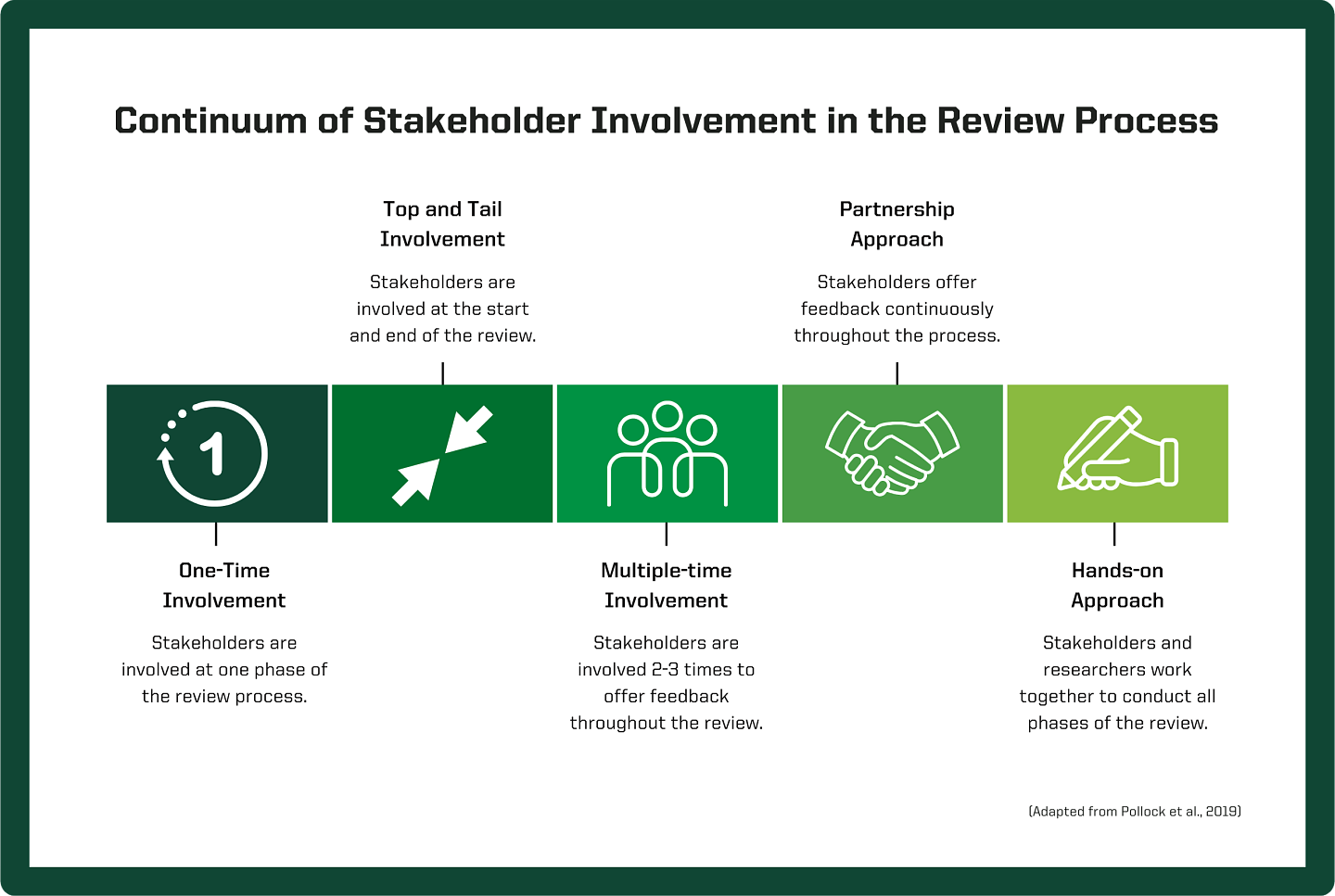By Maria Schweer-Collins, PhD, Research Assistant Professor & Elizabeth Day, PhD, Research Assistant Professor, HEDCO Institute for Evidence-Based Educational Practice
The use of evidence synthesis is rapidly growing, estimated as more than a 20-fold increase over the last two decades. This is equivalent to 80 systematic reviews per day in 2019. In the field of education, researchers are increasingly using evidence synthesis findings to inform policy and practice. We know, though, that conducting high-quality evidence syntheses by itself does not ensure those findings will be used in educational decision-making. Relationship-building and stakeholder engagement throughout the research process are critical steps for ensuring research findings are relevant and accessible beyond academia. The healthcare field has made significant strides in developing guidelines for involving stakeholders in the evidence synthesis process, and today, we will briefly overview those methods with applicability for educational researchers. We will also share how the HEDCO Institute involves education stakeholders (e.g., principals, district leaders, teachers, and educational researchers with domain expertise) in our evidence synthesis process, with examples from our recently completed review on depression prevention programs delivered in schools.
What are the benefits of involving education stakeholders in evidence syntheses?
Stakeholder involvement is particularly important in education, where interventions are often complex, and educators bring valuable expertise that situates empirical findings in the on-the-ground reality of schools. Further, stakeholder engagement approaches can greatly benefit research advances, given recent calls for prioritizing knowledge mobilization research in education. When educational researchers include stakeholders as part of the research design process, the resulting research can better respond to pressing issues facing educators. Stakeholder involvement also allows educators to become more familiar with the research process, and research findings may be more credible for other practitioners knowing that educators have been involved in the work. Stakeholder involvement also has the potential to advance the applicability and trustworthiness of educational research, as involvement may shift the power hierarchy between educators and researchers and facilitate a more democratized evidence system in which educators collaborate with researchers to define research questions, seek answers from an array of sources, and interpret findings.
What does stakeholder involvement in the evidence synthesis process look like at the HEDCO Institute?
At the HEDCO Institute, we involve stakeholders at several different junctures of the evidence synthesis process. We currently use what Pollock and colleagues have coined a “Top and Tail” approach. First, our national advisory board provides guidance and prioritizes evidence synthesis topics during our recurring board meetings. Once a topic is selected, we launch each review by interviewing key education stakeholders to develop working definitions of programs or topics of interest and to get feedback on key pieces of evidence or information that education stakeholders want to see represented in the final report and products. Once we complete our review of the evidence, stakeholders review these results and offer reactions and feedback around framing the findings in a way that is meaningful to educators. These stakeholders also suggest other stakeholder groups or individuals who might be interested in the findings to help support the dissemination of findings. There are certainly many ways to involve stakeholders in the systematic review process, as shown in the figure below.

Interested in reading more about guidelines and frameworks for involving stakeholders in the evidence synthesis process?
Follow the links below to learn about strategies currently used in different fields of research.
- ACTIVE Framework – Authors and Consumers Together Impacting eVidencE
- This framework describes involvement as iterative feedback throughout the review process, stakeholders offering feedback at one timepoint, or stakeholders involved at the “top and tail” (beginning and end) of the review.
- This framework describes involvement as iterative feedback throughout the review process, stakeholders offering feedback at one timepoint, or stakeholders involved at the “top and tail” (beginning and end) of the review.
- GRADE EtD: Grading of Recommendations Assessment, Development, and Evaluation Evidence-to-Decisions Framework
- A method to help researchers assess the certainty of evidence to guide policy or practice recommendations for stakeholders.
- A method to help researchers assess the certainty of evidence to guide policy or practice recommendations for stakeholders.
- Involving People
- A training developed by the Cochrane Collaboration to assist researchers in supporting the involvement of patients, families, and healthcare teams in the production of systematic reviews.
- A training developed by the Cochrane Collaboration to assist researchers in supporting the involvement of patients, families, and healthcare teams in the production of systematic reviews.
- JBI Scoping Review Methodology Group’s recommendations for engagement in scoping reviews
- Guidance on how to best involve stakeholders or ‘knowledge users’ into the scoping review process.
- Guidance on how to best involve stakeholders or ‘knowledge users’ into the scoping review process.
- The Patient and Public Involvement (PPI) approach
- This approach for stakeholder involvement centers around incorporating patients’ and medical professionals’ perspectives into the evidence synthesis process.
- This approach for stakeholder involvement centers around incorporating patients’ and medical professionals’ perspectives into the evidence synthesis process.
If you're a researcher who does involve stakeholders, consider these tools for measuring and reporting stakeholder involvement:
- Tool for Recording and Accounting for Stakeholder Involvement
- Guidance for Reporting Involvement of Patients and the Public
- The Cochrane Methods Equity Multi-Stakeholder Engagement Group (MuSE) is also in the process of developing guidanceon methods for collaborator and patient engagement in evidence syntheses.
HEDCO Institute Blog 8- January 29, 2023

